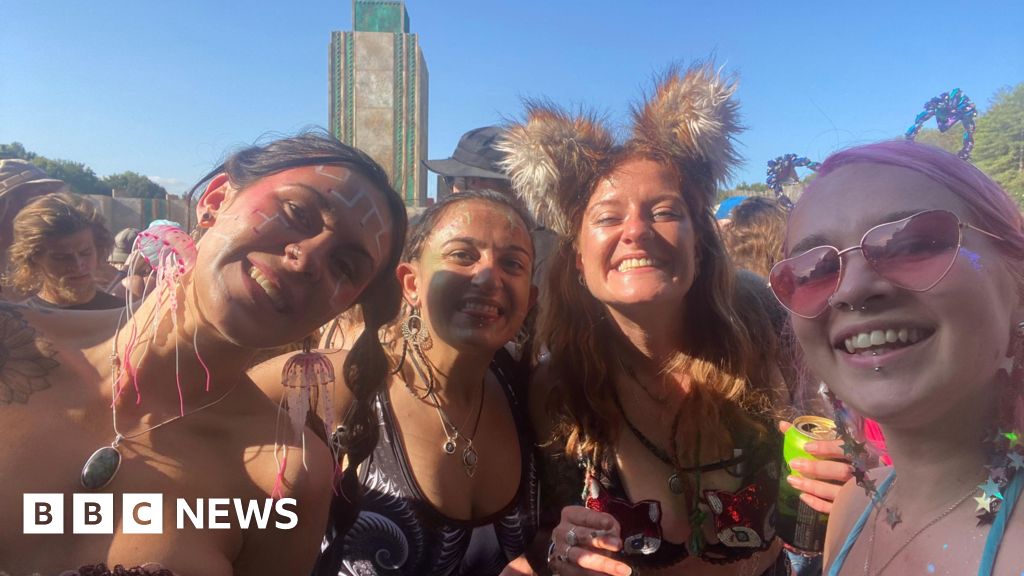


Image source, Chloe Vaggs
A music festival without alcohol might be unimaginable to some, but others enjoying the Glastonbury experience this weekend plan to avoid it altogether.
Apart from the health benefits, a number of festival-goers say they are choosing to forego a drink so they can wake up without a hangover and enjoy more of the event.
Garry Illingworth, 54, from Hampshire, believes he will have more “energy and will see more acts rather than just hanging out and having a drink”.
Meanwhile, Chloe Vaggs, of Bristol, has experienced the dangers of drinking. The 25-year-old said: “It got really bad – I became very dependent on it. I came to the decision that I had no option – I either got sober or chose to die.”
Image source, Garry Illingworth
Mr Illingworth originally stopped drinking before hernia surgery in February.
Following the operation, he decided to continue with the new lifestyle, finding the “positives outweighed the negatives”.
“It’s possible to enjoy yourself without alcohol, which sounds obvious but my social life usually involved drinking alcohol in some way so there was always a worry that it was an essential element, but it isn’t,” he said.
“Non-alcoholic drinks have come a long way over recent years, if you want the taste of a nice cold lager you can still get that, but without the alcohol.”
He also believes it will be easier for him to travel around the event as his rucksack will not be as heavy.
“I won’t be carrying cans of beer, coke and a bottle of rum,” he added.
Image source, Chloe Vaggs
Despite giving up alcohol, Ms Vaggs still wants to enjoy going to festivals with friends.
During her days in rehab, she believed she would never be able to dress up and attend festivals again, something she “loved dearly”.
But in 2023, she decided to try a festival sober.
“I said to myself ‘if there is any doubt, any moment where I’m like, actually this is too much for me or I can’t handle it, then I’m just going to leave and I’m going to go home and I’m not going to miss out and it’s OK’,” she said.
“Then I went to Boomtown last year, and it was the best time,” she added.
“The biggest difference is waking up the next morning and being like ‘I’m ready to go again’.
“I’m happy and I’m full of energy.”
Her sobriety has also helped her learn DJing, which she said had “kept the music alive” for her.
Image source, Adam Collins
Dan Glastonbury used to love having a drink at a festival, but this year he has given up alcohol to support his pregnant wife and toddler. He said being sober at Glastonbury is a very different experience.
“My relationship with alcohol has always been [to] get inebriated fast and have a good time,” he said.
“But being sober has let me see the festival in a new way. I’ve been coming here for 20 years and it’s nice to see it with fresh eyes.”
However, he said some people struggled to understand his decision to stay sober.
“My wife’s pregnant, so if she says she’s not having a drink, no one doubts that,” he continued.
“But as a man, a lot of people have a real issue with it. Some people get quite annoyed at me not drinking. I’d have to deal with people trying to get me to drink, so you have to be strong.”
This year, a special meet up was organised at Glastonbury for those that do not drink.
One of the attendees was Hatty Grant, who has been sober for four-and-a-half years.
This will be her first sober festival experience.
“It used to be an opportunity to get drunk for a weekend and to hang out with my friends of course, but really to be drunk and dance and be silly,” she said.
“And now I just dance and be silly without the being drunk part.”
Adam Collins, 31, from London, will also be avoiding alcohol at Glastonbury. He had to build-up to attending a festival sober by going to smaller social events.
He said he would plan his activities in advance.
“I find that one of the true feelings of Glastonbury is that you can go and explore and get lost. But I think that would potentially lead me to get a beer,” he said.
“I think trying to plan the activities, and make sure my schedule is busy will be important.
“Being in a community as well, with supportive people around you.”